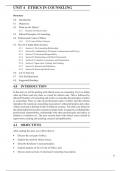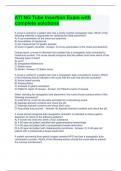Theoretical Approaches to
UNIT 4 ETHICS IN COUNSELING Counseling
Structure
4.0 Introduction
4.1 Objectives
4.2 What are the Ethics?
4.2.1 Reasons for Ethical Codes
4.3 Ethical Principles of Counseling
4.4 Professional Codes of Ethics
4.4.1 ACA Code of Ethics: Purpose
4.5 The ACA Eight Main Sections
4.5.1 Section A: The Counseling Relationship
4.5.2 Section B: Confidentiality, Privileged Communication and Privacy
4.5.3 Section C: Professional Responsibility
4.5.4 Section D: Relationships with Other Professionals
4.5.5 Section E: Evaluation, Assessment, and Interpretation
4.5.6 Section F: Supervision, Training, and Teaching
4.5.7 Section G: Research and Publication
4.5.8 Section H: Resolving Ethical Issues
4.6 Let Us Sum Up
4.7 Unit End Questions
4.8 Suggested Readings
4.0 INTRODUCTION
In this unit we will be dealing with ethical issues in counseling. First we define
what are Ethics and why there is a need for ethical code. This is followed by
ethical Principles of Counseling and in this we elucidate the principles of ethics
in counseling. Then we take up professional codes of ethics and then almost
reproduce the American counseling Association’s ethical principles and codes,
widely used and as defined in their 8 different sections. The ethics are felated to
the relationship between the counselor and the client, in regard to confidentiality,
professional responsibility, relationship with other professionals and ethics as
related to evaluation etc. The next section deals with ethical issues related to
supervision, training and teaching, research and publication.
4.1 OBJECTIVES
After reading this unit, you will be able to:
• Discuss the concept of ethics;
• Explain the need for ethical issues;
• Describe Kitchener’s main principles;
• Explain purpose of ACA Code of Ethics; and
• Discuss main sections of American Counseling Association.
57
,Introduction
4.2 WHAT ARE THE ETHICS?
Counseling is not a value free or neutral activity rather it is a profession based on
values which are orienting beliefs about what is good and how that good should
be achieved. On the basis of the values, counselors and clients take directions in
the counseling process and make decisions. Counselors are guided in their
thoughts and actions by moral values, professional and personal ethics, and legal
precedents and procedures. Counselors who are not aware of their values, ethics
and legal responsibilities as well as those of clients they can cause harm to their
clients despite their good intentions. It is, therefore, vital for counselors to have
knowledge of professional counseling guidelines. Ethical counselors display care
and wisdom in their practice.
The term is often used synonymously with morality, in some case the two terms
overlap. Both deal with what is good and bad or study of human conduct and
values. Yet each has a different meaning.
Kitchener (1986): Ethics involves “making decisions of a moral nature about
people and their interaction in the society”.
Van Hoose (1985): Ethics is generally defined as a philosophical discipline that
is concerned with human conduct and moral decision making.
Ethics are normative in nature and focus on principles and standards that govern
relationship between counselors and clients.
Morality, on the other hand, involves judgment and evaluation of action. It is
associated with such words as good, bad, right, wrong, ought and should (Brandt,
1959).
4.2.1 Reasons for Ethical Codes
Ethical standards exist for many reasons. They are designed to provide some
guidelines for the professional behaviour of members. One of the primary reasons
is that “without a code of established ethics, a group of people with similar
interests can not be considered a professional organisation” (Allen, 1986). Van
Hoose and Kottler(1985) offer three reasons for the existence if ethical codes:
Ethical standards protect the profession from the government. They allow the
profession to regulate itself and function autonomously.
Ethical standards help control internal disagreement and bickering, thus promoting
stability within the profession.
Ethical standards protect practitioners from the public. Especially in malpractice
cases. If professionals behave according to ethics, the behaviour is judged to be
in compliance with the standards.
In addition, these provide clients with some protection from incompetent
counselors.
Certain other reasons are:
1) Ensuring competent professional behaviour
58
, 2) Responsibility to public trust Ethics in Counseling
3) Professionals monitor their own and other members’ professional behaviour
4) Controversies over the development of ethical codes
5) Ethical dilemmas
6) Character and virtue
7) ACA Ethics code
8) Aspirations and Guidelines
9) Standards
4.3 ETHICAL PRINCIPLES OF COUNSELING
Kitchener (1984) has identified five moral principles which often help to clarify
the issues involved in a given situation. The five principles are: autonomy, justice,
beneficence, non-maleficence.
1) Being trustworthy (fidelity): It involves the notions of loyalty, faithfulness,
and honoring commitments. Being trustworthy is regarded as fundamental
to understanding and resolving ethical issues. Practitioners who adopt this
principle: act in accordance with the trust placed in them; strive to ensure
that clients’ expectations are ones that have reasonable prospects of being
met; honor their agreements and promises; regard confidentiality as an
obligation arising from the client’s trust; restrict any disclosure of confidential
information about clients to furthering the purposes for which it was
originally disclosed.
2) Autonomy: The essence of this principle is allowing an individual the
freedom of choice and action. This principle emphasises the importance of
developing a client’s ability to be self-directing within therapy and all aspects
of life. It addresses the responsibility of the counselor to encourage clients,
when appropriate, to make their own decisions and to act on their own
values. There are two important considerations in encouraging clients to be
autonomous. First, helping the client to understand how their decisions and
their values may or may not be received within the context of the society in
which they live, and how they may impinge on the rights of others. The
second consideration is related to the client’s ability to make sound and
rational decisions. The principle of autonomy opposes the manipulation of
clients against their will, even for beneficial social ends.
3) Beneficence: The principle of beneficence means acting in the best interests
of the client based on professional assessment. Beneficence reflects the
counselor’s responsibility to contribute to the welfare of the client. Simply
stated it means to do good, to be proactive and also to prevent harm when
possible (Forester-Miller & Rubenstein, 1992). It directs attention to working
strictly within one’s limits of competence and providing services on the
basis of adequate training or experience. There is an obligation to use regular
and on-going supervision to enhance the quality of the services provided
and to commit to updating practice by continuing professional development.
An obligation to act in the best interests of a client may become paramount
when working with clients whose capacity for autonomy is diminished
59





